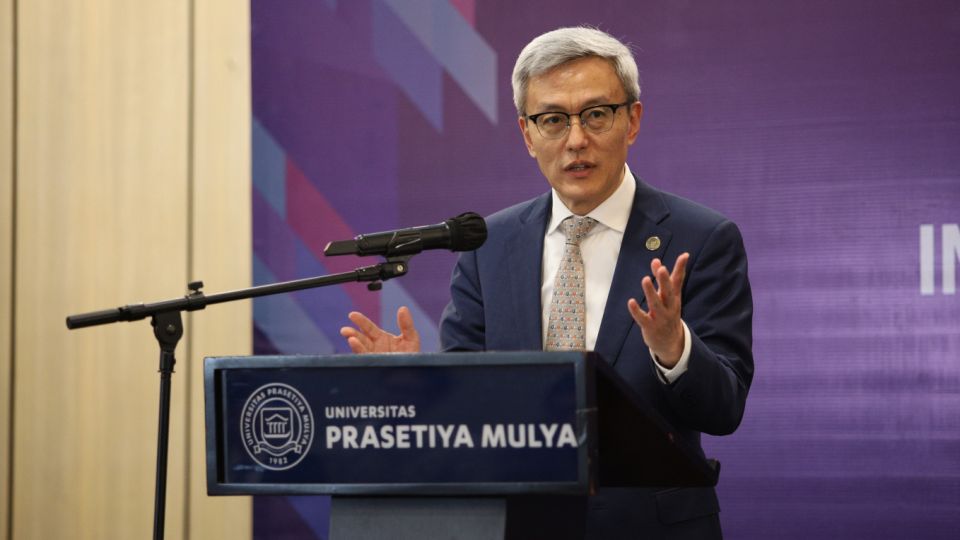June 18, 2024
JAKARTA – The rivalry between the United States and China has become a hallmark of today’s global politics, impacting countries around the world including the nations of ASEAN. To discuss the escalating tension and how countries should navigate a more turbulent world, The Jakarta Post’s M. Taufiqurrahman and Yvette Tanamal sat down with president of the Shanghai Institutes for International Studies (SIIS) Chen Dongxiao on the sidelines of the inauguration of Prasetiya Mulya’s Centre for East Asian Studies (CEAS). In his inaugural lecture at the launch of the CEAS, Chen argued that the trajectory of the United States-China rivalry would be determined by both countries’ domestic politics, especially the election in the US.
The following are excerpts from the interview.
Question: What US domestic political changes do you think will impact the relationship between Washington and Beijing?
Answer: One of the biggest challenges for the forthcoming international order is the uncertainty of US domestic politics, given that in the past few decades there has been a breakdown of consensus on neoliberal reasoning and globalization. You will see that the US is very polarized and divided domestically on the matter.
If Biden succeeds, bilateral relations on the federal level could be predictable, but how different states would act remains a question. A second Trump administration would see immediate changes to trade and investment.
Beijing has said that it needs to engage deeper at the state level, with local people and communities so that in the future, when changes occur in the White House, it will have some kind of buffer to absorb the shock.
Still on domestic politics, how do you see the Indonesia-China relationship under Prabowo Subianto’s leadership?
I think that one of the advantages of China’s relationship with ASEAN countries, including Indonesia, is that Beijing is quite happy to see the continuity of policies. For the past 10 years, President Xi and President [Joko “Jokowi” Widodo] have formed quite a solid personal relationship.
They have met many times, they have formed chemistry and know each other very well. Most importantly, they share a lot of domestic interests, particularly on economic issues. Despite the political differences, ideological differences, as well as geographical distance, the important role of Indonesia in ASEAN means that Beijing will always attach great importance to Indonesia – especially given that our relations with Japan and South Korea these days are not as good as they used to be, as well as India.
Generally speaking, I think that economic cooperation has laid a good solid foundation. Additionally, after almost three decades of relations between China and ASEAN, Beijing has increasingly shared ASEAN values in navigating international relationships, for example the ASEAN Way, which has been well received by China.
As such, predictability has brought certainty. I hope that given the already quite good relationship between the two sides, particularly on economic aspects, Prabowo will follow the track of his predecessor and continue to set up the importance of those economic investments, economic operations and investments.
The Philippines has moved closer to the US, especially amid the South China Sea tension. Will this change the dynamics in ASEAN?
As far as I know about ASEAN, I think the Philippines is exceptional.
They have flip-flopped dramatically in the past few decades – we have seen periods of very good relations with China, followed by deteriorating relations. Other ASEAN countries are quite stable. There’re not many dramatic, flip-flop changes. So, I am not quite certain whether the Philippine model will be copied by others.
As we know, tensions between Manila and Beijing these days are caused by territorial maritime disputes. There has been a lot of news media coverage on those tensions, but this is how the media works– they need to catch eyeballs.
But we shouldn’t let those disputes distract from the overall picture because we are living in an increasingly interdependent and complex world with global challenges ahead of us, like climate change, artificial intelligence, disruptive technology and maintaining stability and prosperity. Huge, daunting tasks are ahead of us.
The South China Sea territorial dispute is a reality, but where will we put those disputes in overall pictures? Will it account for 80 percent, or will it account for 100 percent? If we have a more balanced or proportionally weighted picture, I think that we could have a better, more strategic and clearer understanding about how to deal with those differences. That’s very important.
Many ASEAN countries compartmentalize their relationship with the US and China. They do business with Beijing, and go to Washington for security. What do you think of this?
From an official perspective, Beijing is not that happy with this.
But from a scholarly perspective, I noticed that these kinds of strategies are quite natural for any relatively small country when dealing with big powers. I sometimes tell Beijing that we need to have empathy with their positions.
We understand the hedging policy of not putting all eggs in one basket. It’s a very natural and smart policy. For a long time, the order and architecture of Asia Pacific has been largely a kind of American-centric order. ASEAN countries, despite a lot of complaints about US dominance, are familiar with the US. They know the bad, they know the good.
China’s rise in the contemporary modern period means that it is still in the process, a renaissance. Even if it claims to be benign, time is the only test given the history and disputes between China and some specific countries. We need to be patient and empathetic.
Of course, compartmentalization is not so healthy for a long-term community-building. Washington has tried to intervene in the economic sphere, and use the securitization of the economy to intervene with countries’ economic engagements with China.
It will take some time for Beijing to really assure ASEAN, but it has put a lot of effort into doing so. Any effects will take time as well.


